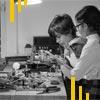London School Adopts AI Platforms and VR Headsets, Eliminating Traditional Teachers

News Synopsis
David Game College in London is pioneering a new approach to education by introducing a teacherless GCSE class that relies entirely on artificial intelligence (AI) and virtual reality (VR) technology. This innovative course, which began in September, aims to provide a personalized learning experience for its students, marking a significant departure from traditional teaching methods.
AI Platforms and VR Technology
In this groundbreaking course, AI platforms and VR headsets replace traditional teachers. Each student uses these technologies to guide their learning journey. The AI assesses individual strengths and weaknesses in real-time, adjusting lesson plans to cater to each student's unique needs. This personalized approach ensures that struggling areas are addressed promptly, while students can revisit topics they excel in at a later stage.
Precision and Accuracy of AI in Education
John Dalton, co-principal of David Game College, highlights the advantages of AI over human teachers. He acknowledges the high level of precision and continuous evaluation that AI offers, which he believes is difficult for humans to achieve. “There are many excellent teachers out there but we're all fallible,” Dalton said. He emphasized that AI can pinpoint learning issues more effectively, providing insights into why a student might not be progressing.
Student Experience and Feedback
The teacherless GCSE course, priced at around £27,000 per year, has received mixed reactions from students. Joseph, one of the students in the program, noted the benefit of AI in identifying and addressing personal learning flaws. “A teacher doesn't really know your flaws because he has so many students,” Joseph explained. “So, he doesn't know your flaws while the AI will figure out what your flaws are and help you improve.”
Role of Learning Coaches
Despite the reliance on AI, students are not left entirely without human support. Three ‘learning coaches’ are present in the classroom to monitor behavior and provide assistance. These coaches also cover subjects that AI currently struggles with, such as art and sex education. Alexander Vansittart, one of the learning coaches and a former Latin teacher, expressed his enthusiasm for the potential of this new educational approach. “I got really excited about what this could do for young people, how it could help them change their lives,” Vansittart said. His passion for the project reflects the optimism surrounding its impact.
Controversy and Debate
The decision to replace traditional teaching with AI has sparked controversy. Chris McGovern, former advisor to 10 Downing Street’s policy unit and head of the Campaign for Real Education, voices concerns about pushing technology too far. While acknowledging the benefits of AI, McGovern warns that reliance on technology might be driven by cost-saving motives rather than educational efficacy. However, David Game College has refuted this claim, stating that they have actually hired more staff to support the course.
Future of AI in Education
As David Game College embarks on this innovative educational journey, the effectiveness of this teacherless model will be closely watched. The integration of AI and VR technology presents a futuristic approach to education, potentially transforming how students learn. Whether this method will prove to be a successful model or a risky experiment remains to be seen as the course progresses and students continue their education without traditional human teachers.
The outcomes of this experiment could have significant implications for the future of education, potentially setting a precedent for how technology can be utilized to enhance learning experiences in the classroom.









